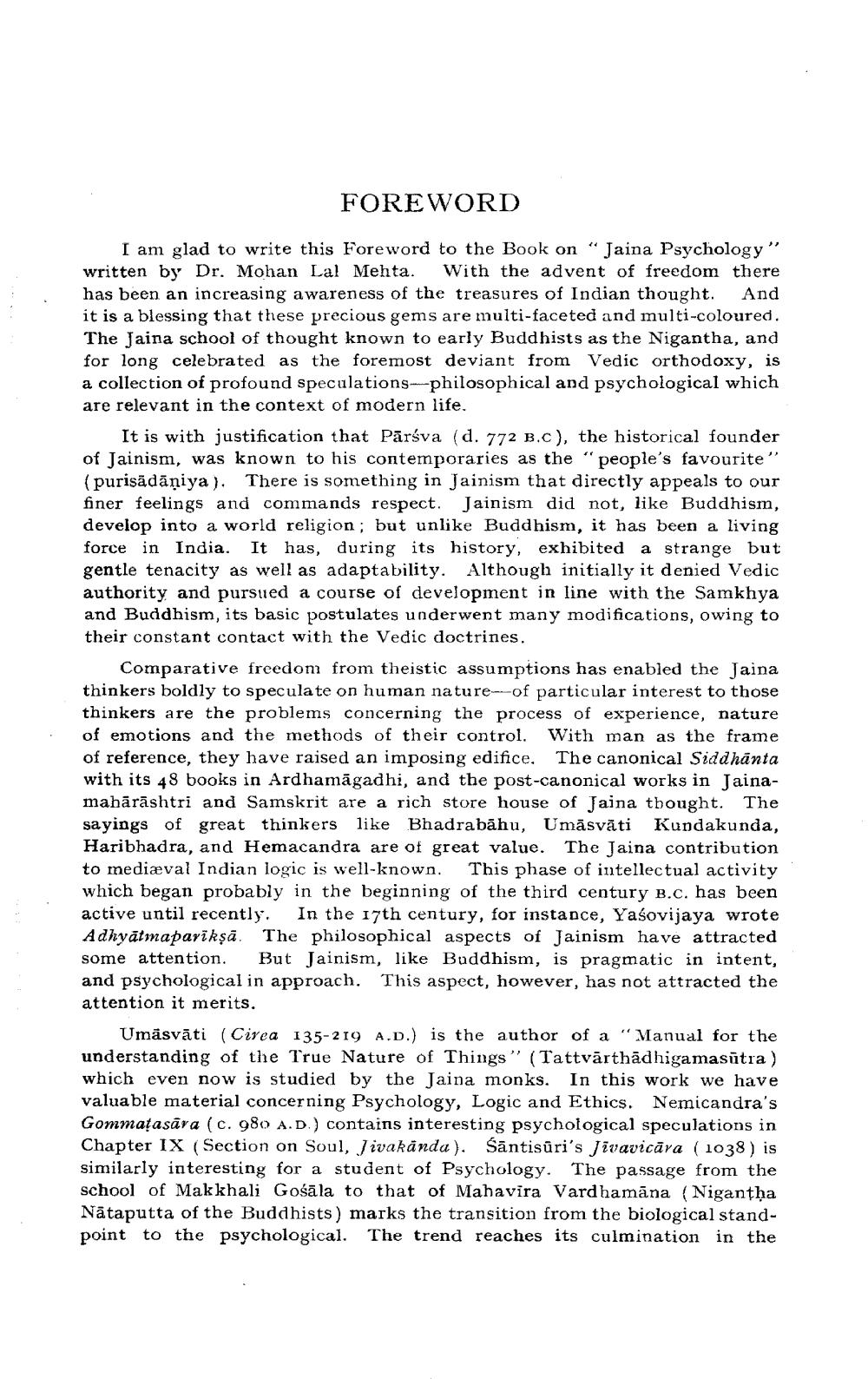Book Title: Jaina Psychology Author(s): Mohanlal Mehta Publisher: Sohanlal Jain Dharm Pracharak Samiti Amrutsar View full book textPage 8
________________ FOREWORD And I am glad to write this Foreword to the Book on "Jaina Psychology" written by Dr. Mohan Lal Mehta. With the advent of freedom there has been an increasing awareness of the treasures of Indian thought. it is a blessing that these precious gems are multi-faceted and multi-coloured. The Jaina school of thought known to early Buddhists as the Nigantha, and for long celebrated as the foremost deviant from Vedic orthodoxy, is a collection of profound speculations-philosophical and psychological which are relevant in the context of modern life. It is with justification that Parsva (d. 772 B.C), the historical founder of Jainism, was known to his contemporaries as the "people's favourite " (purisādāṇiya). There is something in Jainism that directly appeals to our finer feelings and commands respect. Jainism did not, like Buddhism, develop into a world religion; but unlike Buddhism, it has been a living force in India. It has, during its history, exhibited a strange but gentle tenacity as well as adaptability. Although initially it denied Vedic authority and pursued a course of development in line with the Samkhya and Buddhism, its basic postulates underwent many modifications, owing to their constant contact with the Vedic doctrines. Comparative freedom from theistic assumptions has enabled the Jaina thinkers boldly to speculate on human nature-of particular interest to those thinkers are the problems concerning the process of experience, nature of emotions and the methods of their control. With man as the frame of reference, they have raised an imposing edifice. The canonical Siddhanta with its 48 books in Ardhamägadhi, and the post-canonical works in Jainamahārāshtri and Samskrit are a rich store house of Jaina thought. The sayings of great thinkers like Bhadrabāhu, Umāsväti Kundakunda, Haribhadra, and Hemacandra are of great value. The Jaina contribution to mediæval Indian logic is well-known. This phase of intellectual activity which began probably in the beginning of the third century B.C. has been active until recently. In the 17th century, for instance, Yasovijaya wrote Adhyatmaparīkṣā. The philosophical aspects of Jainism have attracted some attention. But Jainism, like Buddhism, is pragmatic in intent, and psychological in approach. This aspect, however, has not attracted the attention it merits. Umāsvāti (Cirea 135-219 A.D.) is the author of a "Manual for the understanding of the True Nature of Things" (Tattvārthadhigamasutra) which even now is studied by the Jaina monks. In this work we have valuable material concerning Psychology, Logic and Ethics. Nemicandra's Gommaṭasara (c. 980 A.D.) contains interesting psychological speculations in Chapter IX (Section on Soul, Jivakānda). Santisūri's Jivavicāra (1038) is similarly interesting for a student of Psychology. The passage from the school of Makkhali Gośāla to that of Mahavira Vardhamana (Nigantha Nataputta of the Buddhists) marks the transition from the biological standpoint to the psychological. The trend reaches its culmination in thePage Navigation
1 ... 6 7 8 9 10 11 12 13 14 15 16 17 18 19 20 21 22 23 24 25 26 27 28 29 30 31 32 33 34 35 36 37 38 39 40 41 42 43 44 45 46 47 48 49 50 51 52 53 54 55 56 57 58 59 60 61 62 63 64 65 66 67 68 69 70 71 72 73 74 75 76 77 78 79 80 81 82 ... 238
